< Reconstruction:Proto-Turkic

Reconstruction:Proto-Turkic/kunduŕ
Proto-Turkic

*kunduŕ
Etymology
Unknown. Eren (1999) argues that this word is composed of *kund (“?”) + *-uŕ (“deverbal noun-making suffix”).
Often compared with Proto-Ugric *kuntɜ (“beaver”), whence Hungarian hód, Northern Mansi хунтыль (huntylʹ). Both loaning directions (Turkic → Ugric, Ugric → Turkic) have been proposed.[1][2]
Original meaning of this root, beaver, is contaminated in select languages with the secondary semantic derivation of otter.
Declension
Declension of *kunduŕ
| Singular 3) | |
|---|---|
| Nominative | *kunduŕ |
| Accusative | *kunduŕnï, *kunduŕug 4), *kunduŕnïg 1) |
| Genitive | *kunduŕnïŋ |
| Dative | *kunduŕka |
| Locative | *kunduŕta |
| Ablative | *kunduŕtan |
| Allative | *kunduŕgaru |
| Instrumental 2) | *kunduŕun |
| Equative 2) | *kunduŕča |
| Similative 2) | *kunduŕlayu |
| Comitative 2) | *kunduŕlugu |
1) Possibly in Pre-Proto-Turkic.
2) The original instrumental, equative, similative & comitative cases have fallen into disuse in many modern Turkic languages.
3) Plurality is disputed in Proto-Turkic. See also the notes on the Proto-Turkic/Locative-ablative case and plurality page in Wikibooks.
4) Found in the Old Turkic era.
2) The original instrumental, equative, similative & comitative cases have fallen into disuse in many modern Turkic languages.
3) Plurality is disputed in Proto-Turkic. See also the notes on the Proto-Turkic/Locative-ablative case and plurality page in Wikibooks.
4) Found in the Old Turkic era.
Descendants
- Oghur:
- Chuvash: хӑнтӑр (hănt̬ăr)
- Common Turkic: *kunduz
- Oghuz:
- Karluk:
- Kipchak:
- Siberian:
- Old Uyghur: kwntwz (kuntuz, “beaver”)
- South Siberian:
- Sayan:
- Tuvan: кундус (kundus, “otter”)
- Tofa: һундус (xundus)
- Yenisei:
- Khakas: хундус (xundus)
- Shor: қумдус (kumdus, “lizard”)
- Sayan:
See also
| Animals in Turkic | |||||
|---|---|---|---|---|---|
 Dog |
dog: *ït |
 Hunting Dog |
hunting dog: *eker |
 Hen |
hen: *tiakïgu |
 Lark |
lark: *torgay |
 Pigeon |
dove, pigeon: *kȫkerčin |
 Quail |
quail: *bïldurčïn |
 Sparrow |
sparrow: *serče | .jpg.webp) Hawk |
hawk, falcon: *kïrguy |
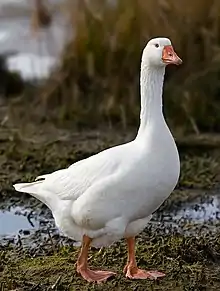 Goose |
goose: *kāŕ |
.jpg.webp) Wolf |
wolf: *bȫrü |
 Cow |
cow: *ingek |
 Calf |
calf: *buŕagu |
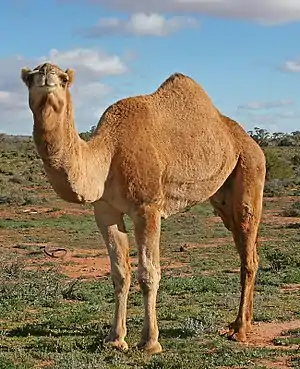 Camel |
camel: *tebe |
.jpg.webp) Young Camel |
young of camel: *kȫĺek, *botu |
 Horse |
horse: *at |
 Foal |
foal: *kulun |
.jpg.webp) Worm |
worm: *kūrt |
 Snake |
snake: *yï̄lan |
_(4).jpg.webp) Fox |
fox: *tilkü |  goat |
goat: *keči | 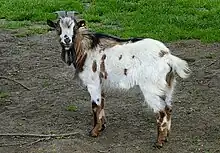 He-goat |
he-goat: *teke |
_male_6y.jpg.webp) Lion |
lion: *arsïlan |
 Fish |
fish: *bālïk | Abramis brama |
carp bream: *čapak |
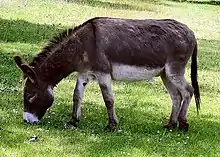 Donkey |
donkey: *eĺčgek |  Carp |
carp: *siāŕgan | 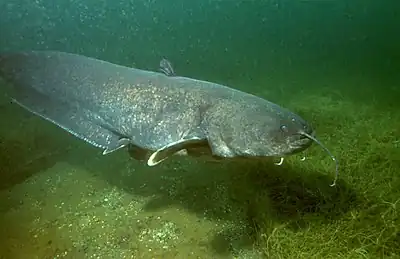 Catfish |
catfish: *yāyïn |
 Beaver |
beaver: *kunduŕ | 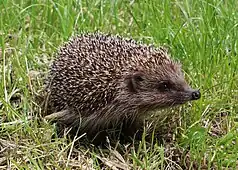 Hedgehog |
hedgehog: *kirpi |  Badger |
badger: *borsmuk |
 Fly |
fly, mosquito: *siŋek |  Bee |
wasp, bee: *ārï | .jpg.webp) Gadlfy |
gadfly: *bȫgen |
_2.jpg.webp) Moth |
moth: *küńe | 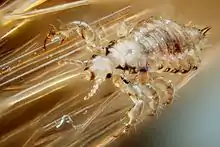 Louse |
louse: *bït | 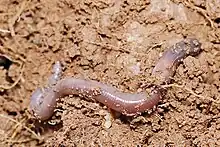 Earthworm |
earthworm: *sïbuĺgan |
 Yak |
yak: *kotuz | 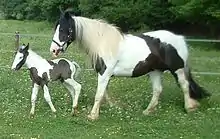 Colt |
colt: *sïp | 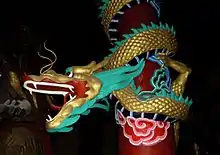 Dragon |
dragon: *siāŕgan |
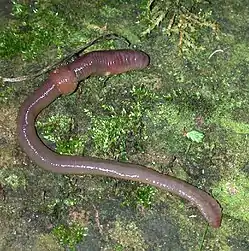 Worm |
worm: *kūrt | 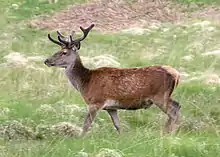 Deer |
deer: *keyik, *sïgun, *bulan, *bugu | 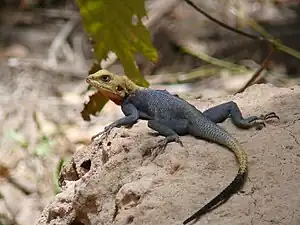 Lizard |
lizard: *keleŕ |
References
- Entry #1781 in Uralonet, online Uralic etymological database of the Hungarian Research Centre for Linguistics.
- Dybo, A. V. (2007) Lingvističeskije kontakty rannix tjurkov: leksičeskij fond, pratjurkskij period [Language contacts of early Turks. The Proto-Turkic period] (in Russian), Moscow: Oriental Literature, Russian Academy of Sciences
- Clauson, Gerard (1972) “kunduz”, in An Etymological Dictionary of pre-thirteenth-century Turkish, Oxford: Clarendon Press, page 635
- The template Template:R:tr:Eren does not use the parameter(s):
entry=kunduz
Please see Module:checkparams for help with this warning.Eren, Hasan (1999) “Proto-Turkic/kunduŕ”, in Türk Dilinin Etimolojik Sözlüğü [Etymological Dictionary of the Turkish Language] (in Turkish), Ankara: Bizim Büro Basım Evi, page 267 - Räsänen, Martti (1969) “*kuntuz (< *kuntuŕ)”, in Versuch eines etymologischen Wörterbuchs der Türksprachen (in German), Helsinki: Suomalais-ugrilainen seura, page 301
- Doerfer, Gerhard (1963–1975) Türkische und mongolische Elemente im Neupersischen [Turkic and Mongolian Elements in New Persian] (Akademie der Wissenschaften und der Literatur: Veröffentlichungen der Orientalischen Kommission) (in German), Wiesbaden: Franz Steiner Verlag, page 1534
External links
This article is issued from Wiktionary. The text is licensed under Creative Commons - Attribution - Sharealike. Additional terms may apply for the media files.